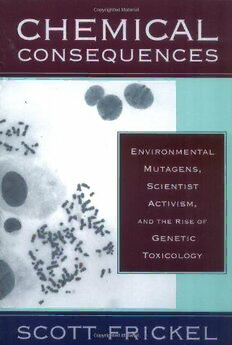
Chemical Consequences PDF
215 Pages·2004·2.057 MB·English
Most books are stored in the elastic cloud where traffic is expensive. For this reason, we have a limit on daily download.
Preview Chemical Consequences
Description:
Frickel (sociology, Tulane U.) examines a scientists' social movement that became the study of genetic toxicology. As a group of scientists became aware that synthetic chemicals could change genetic structures, they became activists, developing a network of researchers and politicians, establishing funding, and publishing articles and books that came to define environmental health science. Frickel explains how researchers on mutations had to carefully differentiate those caused by synthetic chemicals, developing new methods of acquiring and analyzing data. The results were so alarming, and convincing, that the scientists were able to enlist the aid of others with expertise into a unique social movement based on evidence rather than mere emotional reaction; they then began to work within the political arena to inform those who made environmental policy. Appendices include a list of scientists interviewed in this study and a timeline of events from the beginnings of the movement in 1964 through 1976.
See more
The list of books you might like
Most books are stored in the elastic cloud where traffic is expensive. For this reason, we have a limit on daily download.
